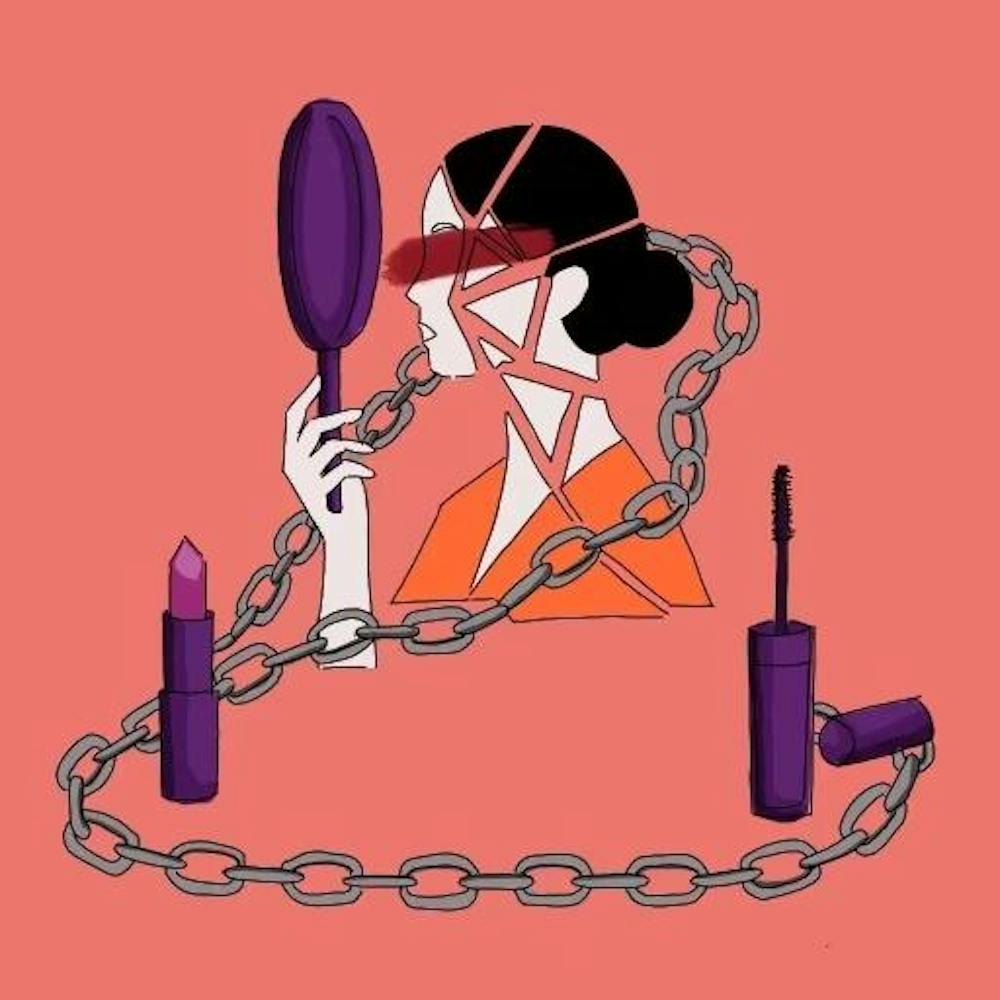When my mom and her sister came up to visit me a couple weeks ago, my friends couldn’t stop cracking jokes about how strong my mom’s genetics are — and they’re right. My mom has four sisters, most of whom have the same brown hair, hooded eyes, freckles and short build. I’ve been mistaken for all their daughters and sometimes even as a sister myself. Growing up, my mom and aunts were the most beautiful women in the world. When someone told me I resembled my late grandma, it felt like winning Miss America. Though I have my fair share of insecurities, I find comfort in knowing I look like these women I find so beautiful — my aunts, mother, sister and cousins. Now, as I fall down the wormhole of makeup influencers and plastic surgeon critiques on TikTok and Instagram, I wonder how this beauty culture shapes women and how it will affect future generations of girls.
While plastic surgery and beauty culture is by no means a woman-only space, it’s impossible to ignore how thoroughly women dominate both in numbers and visibility. When it comes to plastic surgeries, it seems that COVID-19 has truly been the gift that keeps on giving. Since2020, plastic surgery procedures have increased by around 50%. Of the five most common cosmetic procedures in 2023, two were weight-loss-related and two were breast procedures. Women spend about $1,000 more per year on beauty products and services than men, despite earning roughly $15,000 less in median income. From celebrities to family members, young children today are seeing people they idolize spend lots of time and money to alter multiple aspects of their appearance. This constant exposure to women who seem terrified of wrinkles or are insecure about their bra size instills similar anxieties in children before they even hit puberty.
Kelly Brooks, a psychologist at Roger Williams University, agrees that parents can significantly influence their children’s body image. Her research found that women with fathers who focused on physical appearance – such as the importance of dressing well or dieting – had more desire to get plastic surgery. Brooks argues that the heightened emphasis on physical appearance and meeting society’s standards likely gives children a heightened sense of their appearance and a stronger desire to alter it. Although her research doesn’t focus on parents who have been operated on, she suggests that if parents’ disclosure of their surgery reinforces the importance of societal beauty standards, it could negatively affect their children’s body image. It also likely leads to parents sounding like hypocrites in the future: How can a parent call their child beautiful when they only felt beautiful when they changed some of their features, especially ones they may share with their child? How would a parent feel if their child decided to get plastic surgery? Even the most high-profile women who love plastic surgery, like the Kardashian-Jenners, have expressed this fear. Kylie Jenner, who has been deflecting plastic surgery rumors since she was 17, said that she would be devastated if her daughter got plastic surgery, especially at the age that she had work done. Similarly, Courtney Cox had a wake-up call that she had gone too far when her daughter told her she was no longer recognizable due to her procedures.
In the age of social media-driven beauty culture, it is getting harder and harder to be comfortable with ourselves, as new standards, qualifications and definitions of beauty go viral every day. Terms like seasonal color analysis, facial harmony and eyebrow blindness now give names to even more potential insecurities for young women. And when a woman’s beauty goes hand in hand with her sense of worth, finding out you’re wearing beige as a true winter can be just as detrimental to one’s self-esteem as failing a test or losing a friend. If beauty culture is truly about making women more comfortable in their skin, why is there such an emphasis on products and procedures that mask or modify their natural features?
For the record, I don’t believe in shaming or judging women who have gotten plastic surgery or wear heavier makeup. I understand all too well how easy it can be to wish away certain features and replace them with those we’re taught to see as more pleasing, more acceptable, more beautiful. But when considering these procedures, it’s important to think ahead — these are often permanent solutions to problems that may not be as lasting as you fear. Think about your sister, your future daughter or your niece. What message are we sending the girls growing up in our shadow? As women, we never exist in isolation from the communities we nourish, and unfortunately, this is no exception. This uptick in cosmetic surgery and the explosion of microtrends in beauty are expensive, unsustainable and impossible to keep up with. While they may help individual women on their path to self-confidence, they hurt women as a collective by reinforcing the idea that what we look like matters more than any other facet of ourselves. But just as cosmetic surgery and immersion in beauty culture affect more than any individual woman, no single person is responsible for creating it either.
The best thing we can do for ourselves is try to de-influence ourselves from the curated, photoshopped “reality” that we see online. Happiness looks different for everyone, but it’s unlikely that many of your anxieties and fears will disappear with a facelift or Botox. My only hope is that women choosing to undergo these procedures understand that no amount of surgery will make you everything you are supposed to be in the eyes of society.
Mary O’Riordan ’27 can be reached at mary_oriordan@brown.edu. Please send responses to this column to letters@browndailyherald.com and other op-eds to opinions@browndailyherald.com.





